My personal opinion about baking with squash
- Baking with squash adds natural moisture and sweetness to recipes, enhancing flavors without excess sugar.
- Key squash varieties for baking include butternut for its creamy texture, acorn for its firm bite, and delicata for its subtle flavor.
- Proper preparation, such as draining excess moisture and roasting, significantly improves the texture and taste of baked goods.
- Experimenting with different squash textures can lead to delightful surprises in baking, making the process both creative and rewarding.
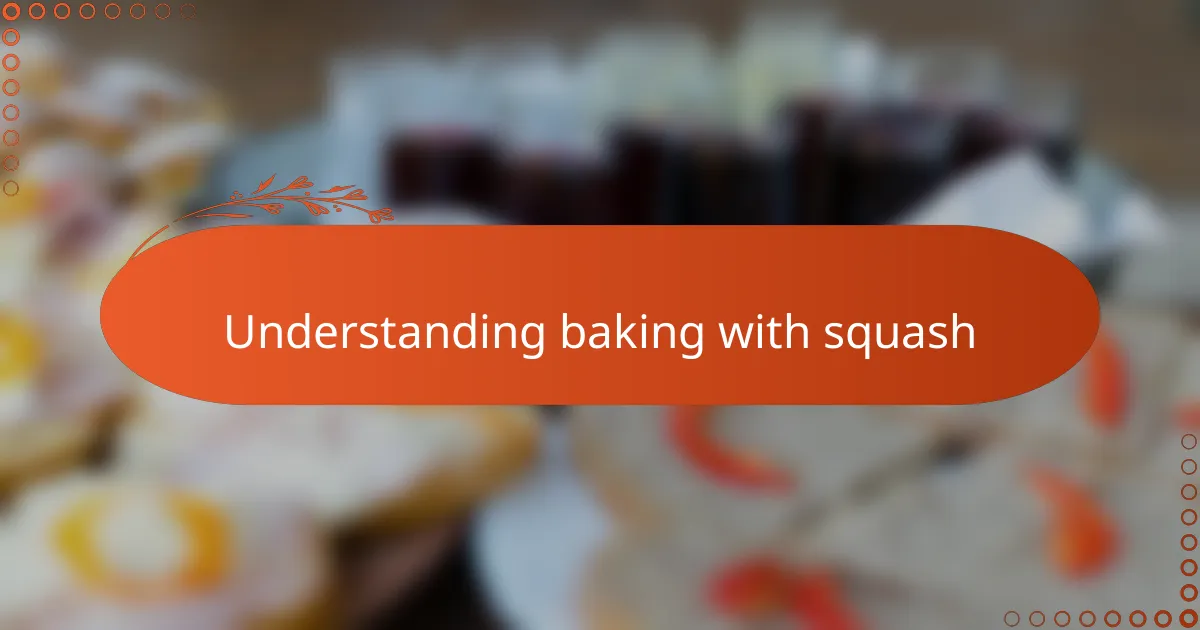
Understanding baking with squash
Baking with squash has a unique charm that I find truly rewarding. Its natural sweetness and moisture can transform simple recipes into something unexpectedly rich and comforting. Have you ever noticed how a baked dish with squash often feels like a warm hug on a chilly day?
From my experience, understanding the textures of different squash varieties is key. For instance, butternut squash melts into a creamy softness, perfect for dense cakes, while acorn squash holds a bit more shape, adding delightful texture. This nuance can really change the outcome, making me appreciate squashes beyond just a seasonal ingredient.
I often ask myself, why is baking with squash so satisfying? Maybe it’s the way it invites creativity and patience, encouraging me to slow down and savor the process. That sense of connection to the earth and tradition is something I’ve grown to love deeply through baking with squash.
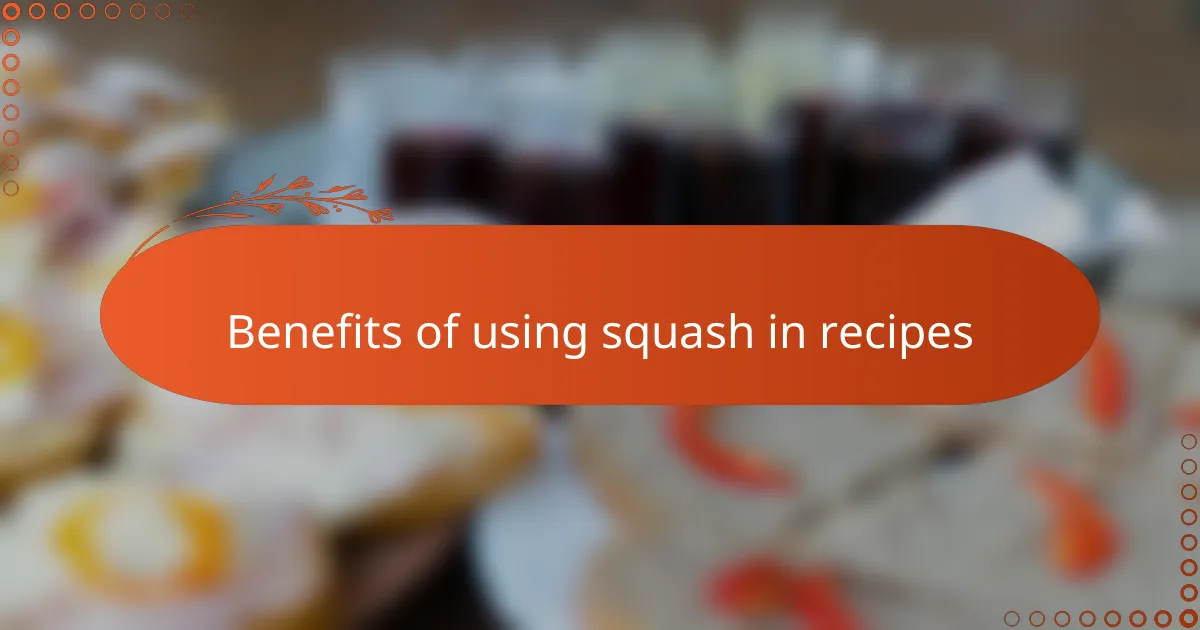
Benefits of using squash in recipes
One of the biggest benefits I’ve found when baking with squash is its incredible ability to add natural moisture to recipes. Have you ever struggled with dry cakes or breads? Squash naturally keeps baked goods tender and soft, which, to me, feels like a little gift from nature that makes every bite more enjoyable.
Another benefit is the subtle sweetness squash brings without the need for extra sugar. This quality lets the flavors shine through in a gentle, comforting way. I often think about how this changes the whole mood of a dish—making it feel wholesome and satisfying without being overly sweet.
I also appreciate how versatile squash is in baking. From breads to muffins to pies, it blends seamlessly yet adds its unique character. This adaptability keeps me experimenting in the kitchen and helps me connect with seasonal cooking in a way that’s both practical and inspiring. Have you noticed how baking with squash can make you feel more in tune with the rhythm of the seasons? I certainly have.

Essential squash varieties for baking
When I think about the essential squash varieties for baking, butternut squash immediately comes to mind. Its smooth, creamy texture and sweet, nutty flavor have consistently elevated my cakes and muffins—almost like a secret ingredient that feels both comforting and indulgent. Have you ever tried swapping pumpkin for butternut in a recipe? The difference in moisture and taste is striking, and it’s become my go-to because it never disappoints.
Acorn squash is another variety I’ve grown fond of, especially when I want a bit more texture in my baked goods. Unlike the buttery softness of butternut, acorn holds its shape just enough to add an interesting bite without overpowering the dish. I remember the first time I used it—it made a simple bread feel special, like it had a story to tell through every crumb.
Then there’s delicata squash, which I find charmingly delicate in flavor and lovely for lighter, more subtle recipes. Its natural sweetness is gentle, which works beautifully in cookies or quick breads where you don’t want the squash to dominate. I often wonder if delicata’s mild personality is why it’s underrated, but that subtlety can really shine when paired with warm spices. Have you given it a try? If not, I’d encourage you to experiment—it might surprise you as much as it did me.
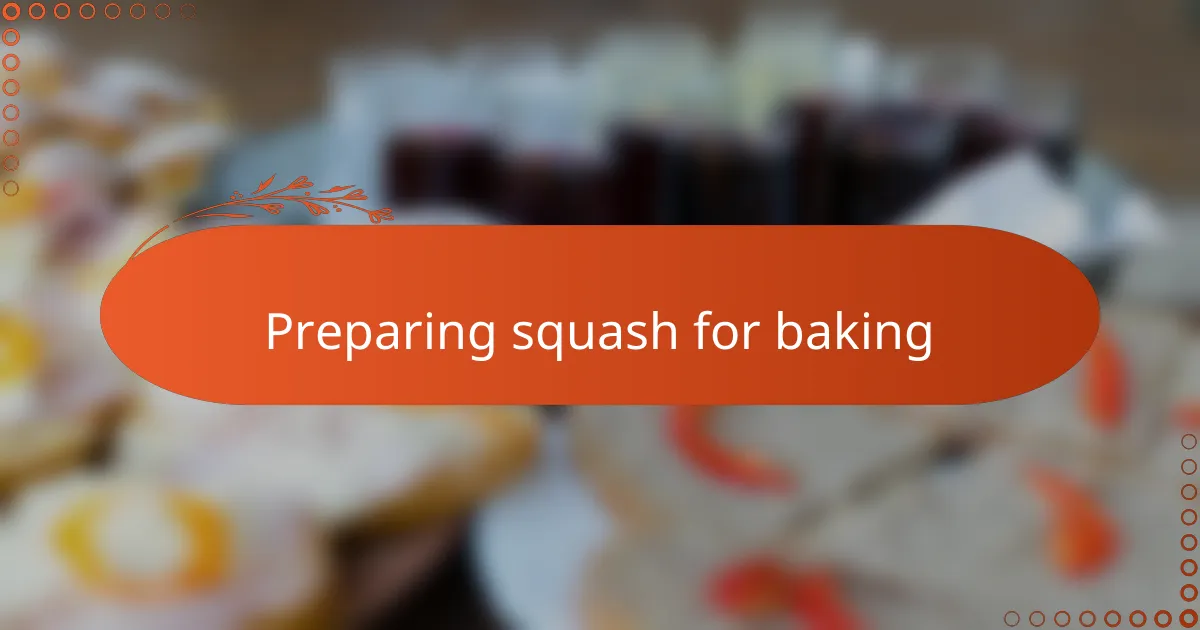
Preparing squash for baking
Peeling and cutting squash is where I usually begin, and I’ve found that taking the time to prep it carefully really pays off. Sometimes I roast the squash first to deepen its sweetness—it’s amazing how this simple step adds a caramelized richness that you can actually smell before you taste it. Don’t you love it when the kitchen fills with that cozy aroma?
When it comes to texture, I’ve learned to adjust my preparation based on the recipe. For something like muffins, I prefer mashing the squash until it’s smooth, but for breads, leaving small chunks brings a delightful surprise in every bite. It makes me think about how much attention to detail matters even in something as humble as peeling and dicing.
One little trick I swear by is draining any excess liquid after cooking the squash. I used to skip this step and ended up with soggy batters more than once. Has that ever happened to you? Once I started squeezing out the extra moisture, the texture of my baked goods improved significantly—making every bite just right.
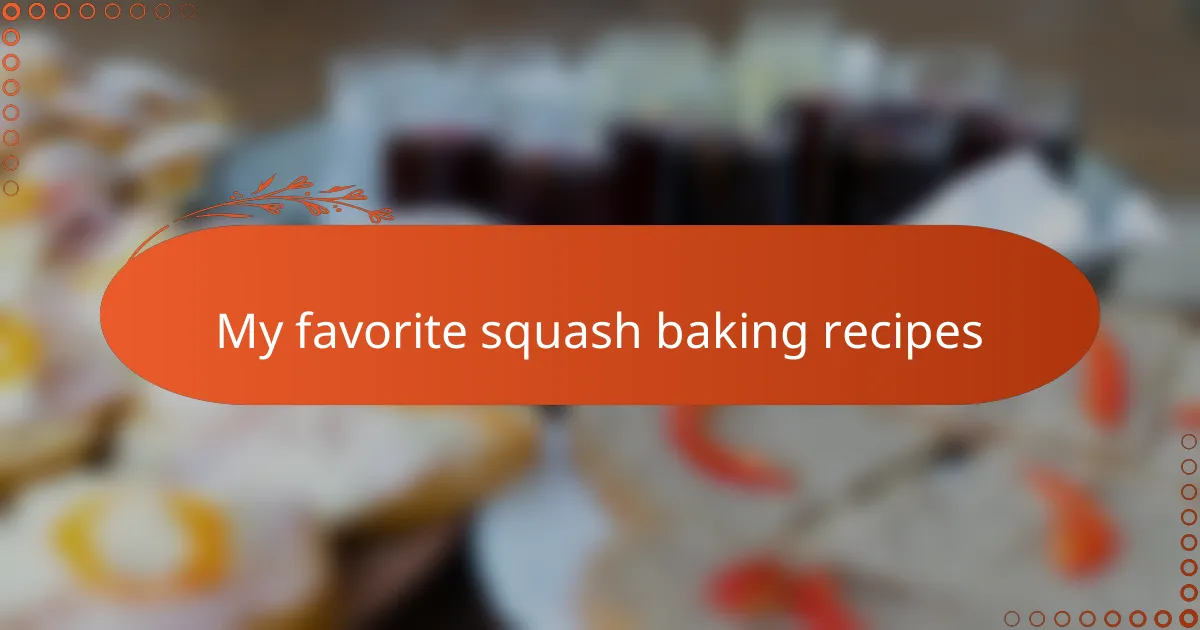
My favorite squash baking recipes
One of my all-time favorite squash baking recipes has to be butternut squash bread. The way the squash’s natural sweetness and moist texture infuse the bread is just incredible. Have you ever bit into a slice that’s so tender and flavorful, it almost feels like a warm memory on your tongue? That’s exactly what happens with this recipe for me.
I also love making acorn squash muffins when I want something with a bit of texture and surprise in every bite. The slight firmness of acorn squash contrasts beautifully with the soft crumb, creating a balance that keeps me reaching for just one more. It’s funny—this recipe started as an experiment, but now it’s a staple in my baking rotation because it feels both rustic and comforting.
Delicata squash cookies are another treat I cherish, especially during the cooler months when I crave subtle flavors. Their gentle sweetness allows the warm spices to shine through without being overwhelming. Have you tried these? If not, I promise you’re missing out on a delicate, buttery bite that somehow feels both nostalgic and refreshingly new.
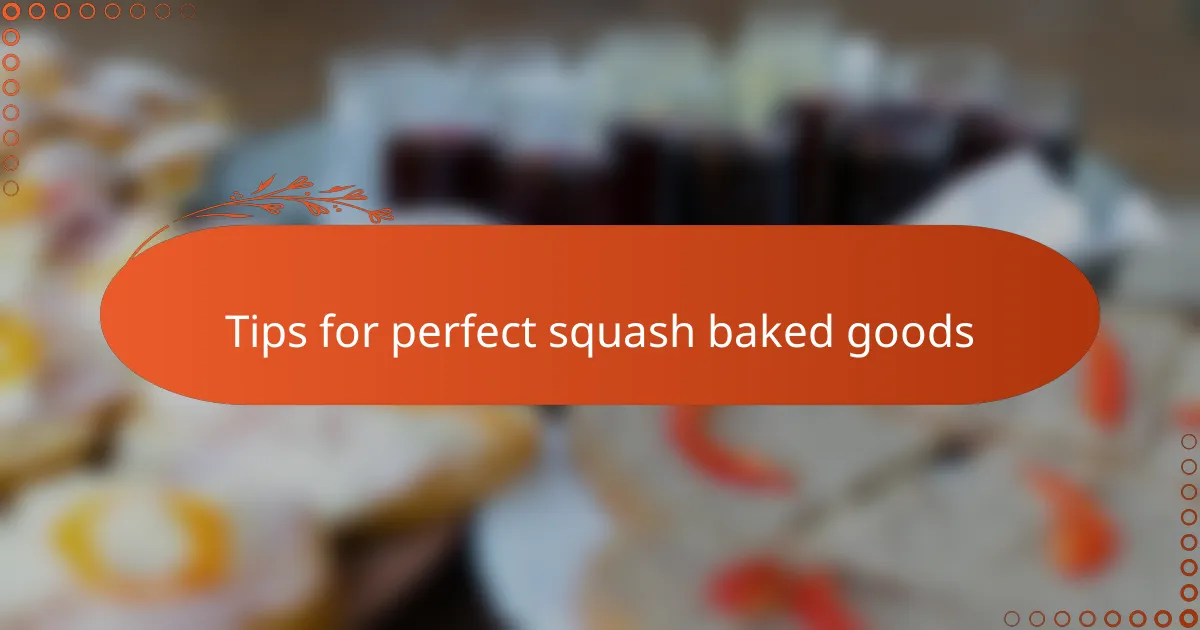
Tips for perfect squash baked goods
One tip I always keep in mind is to balance moisture carefully when baking with squash. Squash adds wonderful natural moisture, but if you don’t drain excess liquid after cooking, your batter can turn soggy. Have you ever bitten into a cake only to find it a bit too dense or wet? I’ve been there, and squeezing out extra moisture made all the difference for me.
Texture is another detail that I pay close attention to. Sometimes I smoothly mash the squash for a consistent crumb, especially in muffins, while other times I leave small chunks to add a bit of surprise in breads. That contrast of soft and chunky really elevates the eating experience in ways I didn’t anticipate at first.
Lastly, I always recommend roasting the squash before using it. Roasting intensifies its natural sweetness and brings out caramelized notes that transform simple baked goods into something rich and cozy. The smell alone fills my kitchen with warmth, and I’m convinced it’s what makes squash baking feel so special every time. Have you tried roasting your squash first? If not, it’s a game-changer.

Personal experiences baking with squash
Baking with squash has been a journey full of little discoveries for me. I remember the first time I used butternut squash in a bread recipe—I was skeptical, but the moist, tender crumb completely won me over. It felt like uncovering a secret ingredient that quietly elevates every bite without stealing the show.
Sometimes, I enjoy experimenting with how the squash’s texture plays out in baked goods. One time, I left larger acorn squash chunks in a muffin batter, and the unexpected bursts of softness and subtle chewiness made each mouthful feel like a comforting surprise. Have you ever stumbled on such happy accidents in the kitchen? They’re what keep baking with squash exciting for me.
There are also moments when baking with delicata squash brings a delicate balance I didn’t anticipate until I tried it myself. Its gentle sweetness paired with warm spices creates cozy flavors that remind me of quiet autumn afternoons—simple, unpretentious, but deeply satisfying. Have you experienced how a humble ingredient like this can tug at your heartstrings through flavor alone? I certainly have.
Source: https://thewannabehomesteader.com/my-personal-opinion-about-baking-with-squash/
Anyone can join.
Anyone can contribute.
Anyone can become informed about their world.
"United We Stand" Click Here To Create Your Personal Citizen Journalist Account Today, Be Sure To Invite Your Friends.
Before It’s News® is a community of individuals who report on what’s going on around them, from all around the world. Anyone can join. Anyone can contribute. Anyone can become informed about their world. "United We Stand" Click Here To Create Your Personal Citizen Journalist Account Today, Be Sure To Invite Your Friends.
LION'S MANE PRODUCT
Try Our Lion’s Mane WHOLE MIND Nootropic Blend 60 Capsules
Mushrooms are having a moment. One fabulous fungus in particular, lion’s mane, may help improve memory, depression and anxiety symptoms. They are also an excellent source of nutrients that show promise as a therapy for dementia, and other neurodegenerative diseases. If you’re living with anxiety or depression, you may be curious about all the therapy options out there — including the natural ones.Our Lion’s Mane WHOLE MIND Nootropic Blend has been formulated to utilize the potency of Lion’s mane but also include the benefits of four other Highly Beneficial Mushrooms. Synergistically, they work together to Build your health through improving cognitive function and immunity regardless of your age. Our Nootropic not only improves your Cognitive Function and Activates your Immune System, but it benefits growth of Essential Gut Flora, further enhancing your Vitality.
Our Formula includes: Lion’s Mane Mushrooms which Increase Brain Power through nerve growth, lessen anxiety, reduce depression, and improve concentration. Its an excellent adaptogen, promotes sleep and improves immunity. Shiitake Mushrooms which Fight cancer cells and infectious disease, boost the immune system, promotes brain function, and serves as a source of B vitamins. Maitake Mushrooms which regulate blood sugar levels of diabetics, reduce hypertension and boosts the immune system. Reishi Mushrooms which Fight inflammation, liver disease, fatigue, tumor growth and cancer. They Improve skin disorders and soothes digestive problems, stomach ulcers and leaky gut syndrome. Chaga Mushrooms which have anti-aging effects, boost immune function, improve stamina and athletic performance, even act as a natural aphrodisiac, fighting diabetes and improving liver function. Try Our Lion’s Mane WHOLE MIND Nootropic Blend 60 Capsules Today. Be 100% Satisfied or Receive a Full Money Back Guarantee. Order Yours Today by Following This Link.






